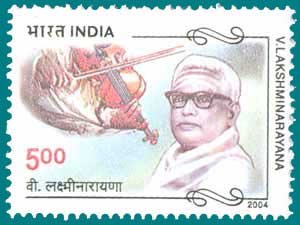V. Lakshminarayana (1911-1990)

Technical Data
| Date of Issue | April 14, 2004 |
|---|---|
| Denomination | Rs. 5 |
| Quantity | 400,000 |
| Perforation | comb 13½ x 13 |
| Printer | Security Printing Press, Nashik |
| Watermark | No Watermark |
| Colors | Multicolor |
| Catalog Codes |
Michel IN 2020 Stamp Number IN 2056 Yvert et Tellier IN 1785 Stanley Gibbons IN 2197 WADP Numbering System - WNS IN006.04 |
| Themes | Commemoration | Famous people | Musical Instruments | Musicians | Optical Instruments |
Table of Contents
V. Lakshminarayana: Celebrating a Maestro’s Legacy
Introduction and Musical Journey:
Born on January 11, 1911, V. Lakshminarayana was a legendary violinist and music teacher who revolutionized the use of the Western violin in Indian classical music. Starting his training at just four years old, Lakshminarayana followed the traditional Guru-Shishya parampara, which originated from Baluswamy Dikshitar, known for introducing the violin to Carnatic music. His early virtuosity was evident when he began performing at vocal concerts by the age of seven, impressing both critics and listeners alike.
Western Violin and Teaching:
While his career began in vocal performances, his deep interest in the violin led him to study under Thimpableadal Srinivasa Iyengar. Lakshminarayana’s innovative style combined Western violin techniques with the intricate demands of Indian classical music. His career expanded as he became a Professor of Music at Jaffna College in Sri Lanka during the 1940s, where he performed and recorded extensively. By 1955, he led the Radio Ceylon Orchestra, becoming a renowned figure in South Asia’s musical circles.
Innovative Playing Techniques:
V. Lakshminarayana was an innovator who transformed violin playing with unique techniques, such as using all four fingers of the left hand for simultaneous playing and plucking, and employing vigorous right-hand bowing techniques. His innovations were admired by world-class violinists like Lord Yehudi Menuhin and Stephane Grappelli. Lakshminarayana also earned the nickname Panchanadai Lakshminarayana for his groundbreaking ability to play complex “Varnams” in five speeds (Pancha Nadai).
Legacy of Teaching:
Lakshminarayana’s teaching was just as influential as his performing. He passed on his rich musical heritage to students, including his own sons—L. Vaidyanathan, L. Subramaniam, and L. Shankar—all of whom became acclaimed violinists in their own right. He also introduced new bowing techniques and styles that resonated in both classical and contemporary music globally.
The Lakshminarayana Global Music Festival:
After Lakshminarayana’s death in 1990, his son Dr. L. Subramaniam founded the Lakshminarayana Global Music Festival in his honor. This festival attracts world-renowned musicians from different genres, such as Steven Seagal, Larry Coryell, Hans Fredrick Jacobsen, and more. The event celebrates the fusion of Indian classical music with global traditions and has become a prestigious platform for cultural exchange.
Commemorative Stamp:
In recognition of his monumental contributions to Indian classical music and the global influence of his innovations, the Department of Posts has issued a commemorative postage stamp. The stamp celebrates his life, his pioneering work in violin techniques, and the enduring legacy he left through his students, family, and compositions.
Lakshminarayana International Award:
In his memory, the Lakshminarayana International Award was instituted, with its first recipient being Lord Yehudi Menuhin. Subsequent awardees include renowned artists like Pandit V.G. Jog and Dr. Semmangudi Srinivasa Iyer.
Conclusion:
Through his inventive spirit and dedication to music, V. Lakshminarayana lives on in the global music community. His contributions to both Carnatic and Western violin techniques continue to resonate, inspiring musicians worldwide.
